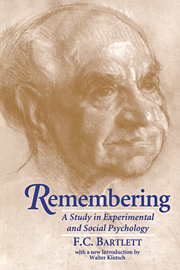Book contents
- Frontmatter
- Contents
- Biography of Sir Frederic C. Bartlett
- Introduction by Walter Kintsch
- Preface
- PART I EXPERIMENTAL STUDIES
- Chapter I Experiment in Psychology
- Chapter II Experiments on Perceiving
- Chapter III Experiments on Imaging
- Chapter IV Experiments on Remembering: (a) The Method of Description
- Chapter V Experiments on Remembering: (b) The Method of Repeated Reproduction
- Chapter VI Experiments on Remembering: (c) The Method of Picture Writing
- Chapter VII Experiments on Remembering: (d) The Method of Serial Reproduction; I
- Chapter VIII Experiments on Remembering: (e) The Method of Serial Reproduction; II. Picture Material
- Chapter IX Perceiving, Recognising, Remembering
- Chapter X A Theory of Remembering
- Chapter XI Images and their Functions
- Chapter XII Meaning
- PART II REMEMBERING AS A STUDY IN SOCIAL PSYCHOLOGY
- Index
- Plate section
Chapter X - A Theory of Remembering
Published online by Cambridge University Press: 04 August 2010
- Frontmatter
- Contents
- Biography of Sir Frederic C. Bartlett
- Introduction by Walter Kintsch
- Preface
- PART I EXPERIMENTAL STUDIES
- Chapter I Experiment in Psychology
- Chapter II Experiments on Perceiving
- Chapter III Experiments on Imaging
- Chapter IV Experiments on Remembering: (a) The Method of Description
- Chapter V Experiments on Remembering: (b) The Method of Repeated Reproduction
- Chapter VI Experiments on Remembering: (c) The Method of Picture Writing
- Chapter VII Experiments on Remembering: (d) The Method of Serial Reproduction; I
- Chapter VIII Experiments on Remembering: (e) The Method of Serial Reproduction; II. Picture Material
- Chapter IX Perceiving, Recognising, Remembering
- Chapter X A Theory of Remembering
- Chapter XI Images and their Functions
- Chapter XII Meaning
- PART II REMEMBERING AS A STUDY IN SOCIAL PSYCHOLOGY
- Index
- Plate section
Summary
THE METHOD OF APPROACH
The most persistent problems of recall all concern the ways in which past experiences and past reactions are utilised when anything is remembered. From a general point of view it looks as if the simplest explanation available is to suppose that when any specific event occurs some trace, or some group of traces, is made and stored up in the organism or in the mind. Later, an immediate stimulus re-excites the trace, or group of traces, and, provided a further assumption is made to the effect that the trace somehow carries with it a temporal sign, the re-excitement appears to be equivalent to recall. There is, of course, no direct evidence for such traces, but the assumption at first sight seems to be a very simple one, and so it has commonly been made.
Yet there are obvious difficulties. The traces are generally supposed to be of individual and specific events. Hence, every normal individual must carry about with him an incalculable number of individual traces. Since these are all stored in a single organism, they are in fact bound to be related one to another, and this gives to recall its inevitably associative character; but all the time each trace retains its essential individuality, and remembering, in the ideal case, is simple re-excitation, or pure reproduction.
Now we have seen that a study of the actual facts of perceiving and recognising suggests strongly that, in all relatively simple cases of determination by past experiences and reactions, the past operates as an organised mass rather than as a group of elements each of which retains its specific character.
- Type
- Chapter
- Information
- RememberingA Study in Experimental and Social Psychology, pp. 197 - 214Publisher: Cambridge University PressPrint publication year: 1995



